- Serbia
Get to know Serbia
- Citizens
Culture and science
Health services
Pension and disability insurance
- Business
Employment
Economy
- Media
- Government
- Contact
Keep in touch
Contact form
Back
Keepin touch
Whether you have a question, comment, suggestion or any problem in the purview of the government, send us your message and we will try to respond as soon as possible. If your problem is not in our purview, we will forward your message to the relevant institution.
Q:
A:
Law to deal with accessories to war criminals
Belgrade,
3 October 2007
Serbian Minister of Justice Dusan Petrovic said today that through amendments to the Law on the organisation and competencies of state organs prosecuting perpetrators of war crimes it will become possible to initiate criminal procedure against accessories to war crimes.
Presenting the Bill on amendments to the said law in Serbian parliament, Petrovic said that this regulation will strengthen the position of the Prosecutor’s Office and allow the court to establish facts in a criminal procedure in a legitimate manner.
He stressed that it is very important that the Serbian War Crimes Prosecutor’s Office and the National Council for Cooperation with the ICTY have legal conditions for conducting investigation against accessories who give refuge to perpetrators of war crimes or those who are suspected of covering their tracks and obstructing the law.
It is of extraordinary and invaluable importance for Serbia to establish whether suspects or those accused of most serious crimes are in fact guilty or not. I am convinced that Serbia has the strength to establish the truth. When it is suspected that a criminal act has been committed, there is no other truth except the truth established in the court, said Minister Petrovic.
According to Petrovic, criminal procedure for the most serious crimes, such as organised crime and war crimes, cannot be conducted without special procedure and rules which step back from regular areas of criminal law.
Petrovic noted that setting-up special judicial organs for this type of crime has been fully justified because the regular judiciary cannot deal with that as well. He also recalled that in 2003, Serbia adopted laws which established the rules of criminal procedure in fighting organised crime and war crimes.
On September 25, the government forwarded amendments to Serbian parliament concerning the Law on organisation and competencies of state organs prosecuting perpetrators of war crimes.
These amendments envisage that at the proposal of the war crimes prosecutor, the court may order surveillance of telephone and other conversations of persons who are suspected of having assisted perpetrators of war crimes after the crime was committed.
These measures, which may last up to six months, will be conducted by the police, the security and intelligence agency and the military intelligence agency, though at the request of the prosecutor the court may twice extend the surveillance period to three months at the most.
Following the justice minister’s speech, parliament members began the discussion of these legal amendments.
He stressed that it is very important that the Serbian War Crimes Prosecutor’s Office and the National Council for Cooperation with the ICTY have legal conditions for conducting investigation against accessories who give refuge to perpetrators of war crimes or those who are suspected of covering their tracks and obstructing the law.
It is of extraordinary and invaluable importance for Serbia to establish whether suspects or those accused of most serious crimes are in fact guilty or not. I am convinced that Serbia has the strength to establish the truth. When it is suspected that a criminal act has been committed, there is no other truth except the truth established in the court, said Minister Petrovic.
According to Petrovic, criminal procedure for the most serious crimes, such as organised crime and war crimes, cannot be conducted without special procedure and rules which step back from regular areas of criminal law.
Petrovic noted that setting-up special judicial organs for this type of crime has been fully justified because the regular judiciary cannot deal with that as well. He also recalled that in 2003, Serbia adopted laws which established the rules of criminal procedure in fighting organised crime and war crimes.
On September 25, the government forwarded amendments to Serbian parliament concerning the Law on organisation and competencies of state organs prosecuting perpetrators of war crimes.
These amendments envisage that at the proposal of the war crimes prosecutor, the court may order surveillance of telephone and other conversations of persons who are suspected of having assisted perpetrators of war crimes after the crime was committed.
These measures, which may last up to six months, will be conducted by the police, the security and intelligence agency and the military intelligence agency, though at the request of the prosecutor the court may twice extend the surveillance period to three months at the most.
Following the justice minister’s speech, parliament members began the discussion of these legal amendments.
-
 Belgrade, 4 January 2026
Belgrade, 4 January 2026Violation of UN Charter has become dominant principle of contemporary politics
-
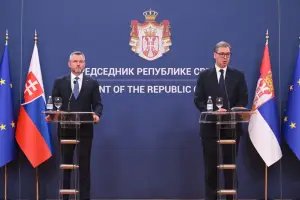 Belgrade, 21 December 2025
Belgrade, 21 December 2025Strengthening cooperation with Slovakia in many areas
-
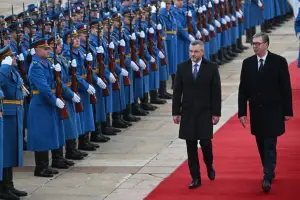 Belgrade, 21 December 2025
Belgrade, 21 December 2025President of Slovakia ceremonially welcomed in front of Palace of Serbia
-
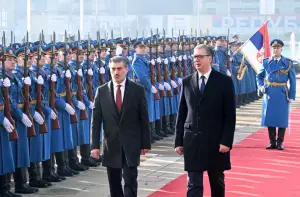 Belgrade, 18 December 2025
Belgrade, 18 December 2025Vučić welcomes President of Georgia in front of Palace of Serbia
-
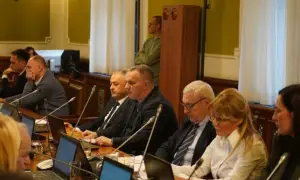 Belgrade, 15 December 2025
Belgrade, 15 December 2025Serbia needs strong, stable education system
-
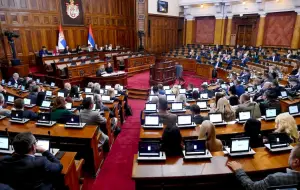 Belgrade, 3 December 2025
Belgrade, 3 December 2025Parliament adopts 2026 budget
-
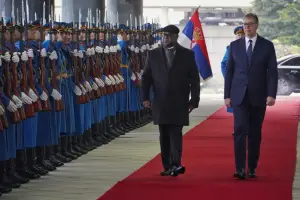 Belgrade, 28 November 2025
Belgrade, 28 November 2025Serbian President welcomes President of DR Congo
-
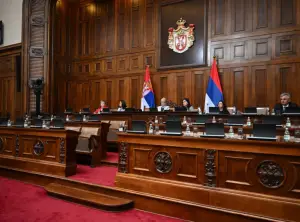 Belgrade, 7 November 2025
Belgrade, 7 November 2025Parliament adopts multiple laws
-
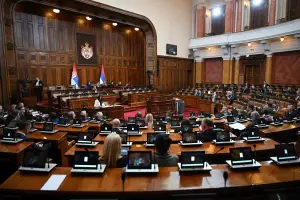 Belgrade, 22 October 2025
Belgrade, 22 October 2025Parliament adopts several laws, ratifies multiple international agreements
-
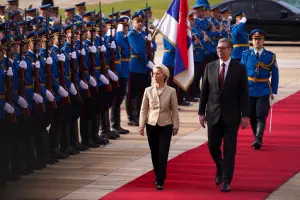 Belgrade, 15 October 2025
Belgrade, 15 October 2025Vučić welcomes Ursula von der Leyen in front of Palace of Serbia
